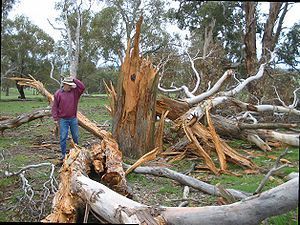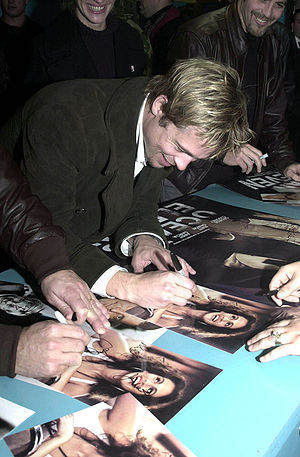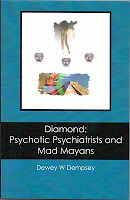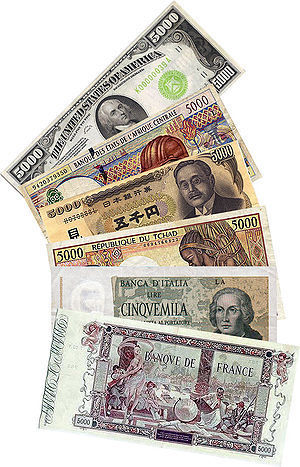Stuart Aken's Blog, page 323
March 15, 2011
Stuart's Daily Word Spot: Zap
 Image via Wikipedia
Image via WikipediaZap: interjection - sound of a laser, ray gun, bullet, etc; sudden or dramatic event, expressed: verb - to kill, give a sudden blow, do away with, destroy; erase or alter; act against; send, put, strike quickly or with force; make more powerful or exciting; enliven, revitalize; overwhelm emotionally; cook or heat in a microwave oven; move quickly; operate a remote control to switch television channels quickly. Noun - energy, vigour, power, drive; strong emotional effect; a charge or bolt of electricity etc.; a beam or burst of radiation etc.
'General Phlobotomiticalitonis waved just one of his nine hundred and fifty seven tentacles and "Zap" went his ray gun, splattering a trillion Gordonian Tribulites in a single blast.'
'The best way to get rid of wasps is to zap the pesky things with a concentrated spray of wasp nest destroyer. One zap and they're history.'
'As the bolt of lightning illuminated the desolate plain, the zap of electrical discharge made the hair on Jennifer's head rise and stand on end.'

Published on March 15, 2011 15:00
March 14, 2011
Stuart's Daily Word Spot: Yada-yada
 Image via Wikipedia
Image via WikipediaYada-yada: noun tedious, trivial or meaningless talk, chatter.
'Caroline comes up to me with that expression she wears when she thinks I'm doing something I shouldn't and gives me this long lecture on how I should be more like Brad Pitt; yada-yada.'

Published on March 14, 2011 15:00
March 13, 2011
Edit of Volume Two Begins
With the completion of the handwritten edit of volume one, I was able to start the typed corrections today, and I've done chapter one, so far.
On volume two, I've modified the old chapter 54 of what was originally a continuation of volume one, to make it into chapter one of the second volume. Lost yet? It needed a lot of insertions to allow virgin readers to be able to pick up the story without having read the first book. But, to my surprise, it didn't need a full rewrite. So, I'm ready to continue with the full edit of the chapters for book 2 that have already been written. once that's done, I'll have to start writing (as in creating) the follow on chapters to complete book 2. But I'll keep up this daily post to let you know how it's going and as a motivation tool for myself when feeling tired.
Actually, I'm unlikely to do more editing tomorrow, or indeed the post, as I have to be at work until late and then I'll be out with my darling, tripping the light fantastic and generally making a fool of myself,but laughing a lot and enjoying the activity. Dance is remarkably spiritually refreshing. You should try it.
The opening waltz always renews my spirit, no matter what sort of day I've had at the boring place I work to earn a crust.


On volume two, I've modified the old chapter 54 of what was originally a continuation of volume one, to make it into chapter one of the second volume. Lost yet? It needed a lot of insertions to allow virgin readers to be able to pick up the story without having read the first book. But, to my surprise, it didn't need a full rewrite. So, I'm ready to continue with the full edit of the chapters for book 2 that have already been written. once that's done, I'll have to start writing (as in creating) the follow on chapters to complete book 2. But I'll keep up this daily post to let you know how it's going and as a motivation tool for myself when feeling tired.
Actually, I'm unlikely to do more editing tomorrow, or indeed the post, as I have to be at work until late and then I'll be out with my darling, tripping the light fantastic and generally making a fool of myself,but laughing a lot and enjoying the activity. Dance is remarkably spiritually refreshing. You should try it.
The opening waltz always renews my spirit, no matter what sort of day I've had at the boring place I work to earn a crust.

Published on March 13, 2011 19:56
Stuart's Daily Word Spot: Xanthippe
 Image via Wikipedia
Image via WikipediaXanthippe: noun - The wife of Socrates, a bad-tempered or scolding wife or woman.
'When George lazily referred to his wife as Xanthippe, she picked up the frying pan and demonstrated the accuracy of his description by beating him over the head with it, whilst yelling imprecations about his manhood at him.'

Published on March 13, 2011 15:00
March 12, 2011
Edit: Volume One is Done
Volume one is now complete, ending with chapter 53 at page 516. So, now I have to start on Volume two, of which I have the first 15 chapters written and ready for editing, and other chapters in need of their first edits. I'll have to pen either an introductory chapter for book 2 or make additions to the current text to make it possible to read as a stand-alone book for those who read it before reading book 1.
I'll start on that tomorrow.
I'm pleased with the first volume, and may start to do the odd sample from time to time to get feedback.
For now, after a full day, I'm ready to relax for what's left of the evening. So, I'll bid you all goodnight.
I'll start on that tomorrow.
I'm pleased with the first volume, and may start to do the odd sample from time to time to get feedback.
For now, after a full day, I'm ready to relax for what's left of the evening. So, I'll bid you all goodnight.
Published on March 12, 2011 21:24
Dewey W. Dempsey, Author Interview:
 Dewey W. Dempsey taught high school and college English for 17 years. He is a professional storyteller, and was a charter member of the Healing Stories Alliance of the National Storytelling Network. He taught storytelling and writing techniques in Arizona, Bermuda, California, Colorado, Georgia and Tennessee. He has written and published four novels and a collection of stories in hard copy and Kindle, and a nonfiction work, "Creating Your Own Spiritual System," in blog form.
Dewey W. Dempsey taught high school and college English for 17 years. He is a professional storyteller, and was a charter member of the Healing Stories Alliance of the National Storytelling Network. He taught storytelling and writing techniques in Arizona, Bermuda, California, Colorado, Georgia and Tennessee. He has written and published four novels and a collection of stories in hard copy and Kindle, and a nonfiction work, "Creating Your Own Spiritual System," in blog form.SA: What was your inspiration for the Diamond Rising Star Adair series.
 DWD: I had just completed and sent of the MS of a heavily researched historical novel on a Cherokee family and the spiritual practices of the Cherokees before 1850. I was camping in the desert near Reno, Nevada and decided to write a contemporary detective novel. As I sat watching the sunrise and sipping my coffee the opening scene presented itself. I spent some time using techniques I had learned when I started creating my own stories for the storytelling circuit and the scene unfolded.
DWD: I had just completed and sent of the MS of a heavily researched historical novel on a Cherokee family and the spiritual practices of the Cherokees before 1850. I was camping in the desert near Reno, Nevada and decided to write a contemporary detective novel. As I sat watching the sunrise and sipping my coffee the opening scene presented itself. I spent some time using techniques I had learned when I started creating my own stories for the storytelling circuit and the scene unfolded.SA: What is your writing technique?
DWD: My technique for writing is to take an image and try to become fully present to it. My storytelling training was that unless I could visualize my stories completely with all of the senses I could not make it real for the audience. Then, the process involves asking the image for the backstory, the motivation, the history. Sometimes I need to research on locations and practical details. With one or two exceptions I never write about a location I have not visited. Even the fictionally created places are composites of places I have visited.
SA: How much revision do you do an your MS?
DWD: My process for the MS beyond the initial draft is two revisions: one focusing on theme and consistency and the other focusing on mechanics. I then send the revised MS to a core of readers from former and current writing groups and friends. I review all of the comments and then do a third revision. I then hire a professional proofreader and do final revisions.
SA: Where and when is your novel set and why did you make these specific choices?
DWD: In this series the locations are determined by the kinds of action that is being developed. In the first two novels, the core set of locations was centered around Denver, Colorado; Tahlequah, Oklahoma; Gran Lac, Wyoming(fictional); New York state and parts of Northern California. In this third novel parts of Mexico, Belize and British Columbia are added.
SA: How can people buy your books?
DWD: My Amazon.com author page includes paperback and Kindle versions. Author Page Amazon http://www.amazon.com/-/e/B004G7B5UC
SA: What qualities make a successful writer?
DWD: People tell me that I have led an interesting life and that is what they see as the strength of my books. The 'bad guys' in my works are based on my years of working with inmates on Death Row and in maximum security prisons, both male and female. This was followed by a career as a therapist working with severely mentally ill populations. I have traveled and observed people from all walks of life.
SA: How do you set about writing a piece?
DWD: So far, in all six of my novels, including the two in progress an opening scene has presented itself and I was off to the races.
SA: To what extent do you think genre is useful in the publishing world?
DWD: The concept of genre was invented by literary critics, not authors. It now determines marketing of fiction. I have not written a book that I feel exclusively fits into any genre. That struggle to select a genre for marketing purposes actually postponed the publication of my first two books.
SA: Do you think writing is a natural gift or an acquired skill?
Both. If the gift is not there no amount of skill will produce it.
SA: What single piece of advice would you give to writers still hoping to be published?
DWD: Persevere.
SA: What are you writing now?
DWD: The second book of the historical fiction (Qua Nie: the Wander Years) and the fourth book of the Diamond Series (Diamond and the Shape-Shifting Mayans).
SA: Do you have a website or a blog that readers can visit?
DWD: People are welcome to visit me at www.obsidianeaglellc.com
SA: Given unlimited resources, what would be your ideal writing environment?
DWD: Lake Tahoe, California; Magog, Quebec; Jay Peak, Vermont; Bermuda.
SA: Where do you actually write?
DWD: Wherever I am. I have a two pound portable word processor whose files can be downloaded to my computer for revision. My most frequent places have been coffee-house, campsites, ski lodges, airports, my deck, friends cabins and various rented cabins and resorts. I have written in over ten US states, four Canadian Provinces, Belize and Los Cabos, Mexico. My most frequent time for writing is dawn or early morning, but I write when I have the inspiration and the time.
PRESS RELEASE:Native-American detective uses intuition, advanced technology to save world from Mayan RevenantsDewey W. Dempsey reintroduces Diamond, a detective with strong Native American roots, in "Diamond: Psychotic Psychiatrists and Mad Mayans"FORT OGLETHORPE, Ga. – Dewey W. Dempsey brings back the daring Diamond Rising Star Adair in the third title of the "Diamond" series, "Diamond: Pyschotic Psychiatrists and Mad Mayans" (ISBN 1456474138). Diamond, a strong, intuitive and well-educated woman, applies her talents toward solving crimes and saving lives.After feeling demeaned and belittled in the first novel, "Diamond and the Bridger Mountain Butcher," a vengeful psychiatrist has his sights set on Diamond and her lover, Jim Sullivan. The psychiatrist enlists the help of two colleagues to help commit serial murders. They begin by planting evidence at the crime scenes that will lead investigators directly to Diamond and Jim. Once the couple's reputation is ruined, the psychiatrist plans to kidnap, torture and kill the couple.Something seems amiss, however, for Diamond and Jim – one his former associates within the government's serial-killers unit appears overly eager in seeing them convicted. Using her detective skills and superior intuition, Diamond discovers that the old colleague belongs to the Mayan Revenants.Searching for the ties behind the man's desire to kill her and her lover, Diamond finds two other members of the group, which plans to infiltrate the United States as part of the looming 2012 prophecies. With redesigned ancient Mayan-Toltec laser-like weapons and communication techniques, Diamond, Jim and America are in danger, and the couple must now outsmart the psychiatrist, the government and the Mayan Revenants."Diamond is different than most lead female detectives in mystery novels," Dempsey says. "She's a blend of Native-American mysticism and advanced technology."Fans of Dempsey's "Diamond" novel series will rejoice over his latest installment. This time the intelligent, instinctive detective travels across Central America, the United States and Canada to save herself, her lover and her country."Diamond: Psychotic Psychiatrists and Mad Mayans" is available for sale online at Amazon.com and other channels.
MEDIA CONTACT:Dewey W. Dempsey: Email: Phone: (706) 956-4889 Website: www.obsidianeaglellc.com

Published on March 12, 2011 16:00
Stuart's Daily Word Spot: Wad
 Image via Wikipedia
Image via WikipediaWad: noun - a small bundle of soft, loose, material used as a plug, pad, or to keep things apart; plug of paper or cloth to keep the powder and shot in position in a gun; something rolled tightly, a bankroll; a lot of something, especially money; a mass, a heap; bun, cake, sandwich: verb - place a wad in a gun, plug a hole with a wad; to force soft, or fibrous material into a small space; to form into a wad.
'The kidnapper forced open her mouth and stuffed a wad of bank notes in to keep her silent.'
'Jane formed a plug from discarded clothing and used it to wad the hole in the dyke, thereby saving the city from a disastrous flood.'

Published on March 12, 2011 15:00
Two Ends of the Pen: Interview with Stuart Aken
Published on March 12, 2011 13:51
March 11, 2011
Slowly Goes the Edit
Another chapter today. Seems so little, but I've had a full day and all continues to go well with the work.
Won't bore you with the details, but most of what I've done is writing related in one way or another. And I have prepared a new author interview for posting tomorrow. Look out for some interesting insights and comments from Dewey Dempsey, a much published author with a great deal of experience.
So, page 508, chapter 53 awaits the red pen tomorrow and, hopefully, I'll get a little more done then.
For now, it's the end of a longish day and time to relax.


Won't bore you with the details, but most of what I've done is writing related in one way or another. And I have prepared a new author interview for posting tomorrow. Look out for some interesting insights and comments from Dewey Dempsey, a much published author with a great deal of experience.
So, page 508, chapter 53 awaits the red pen tomorrow and, hopefully, I'll get a little more done then.
For now, it's the end of a longish day and time to relax.

Published on March 11, 2011 20:56
Stuart's Daily Word Spot: Vacant
 Image via Wikipedia
Image via WikipediaVacant: adjective – an office or position unfilled or unoccupied; containing nothing, empty, uninhabited, untenanted; either occupied nor in use; devoid of or lacking something, entirely free from; showing inattention, lack of intelligence, or thought, empty-headed, expressionless, inane.
'Her expression entirely vacant, Clarissa stared across the vacant lot to where the house stood with its windows broken, doors open and rooms all vacant, as the occupiers had left it when the bomb had dropped.'

Published on March 11, 2011 15:00



